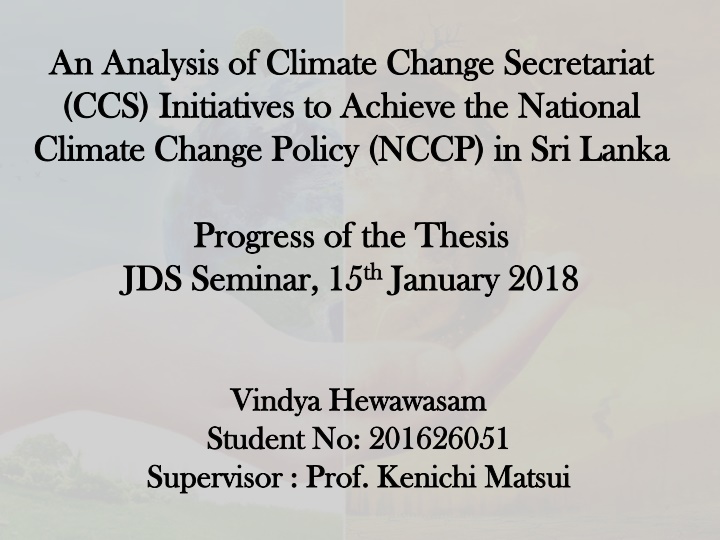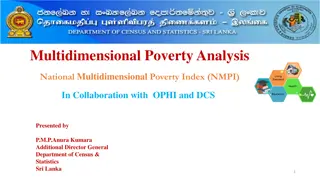Analysis of Climate Change Secretariat Initiatives in Sri Lanka
This analysis focuses on the Climate Change Secretariat's initiatives in Sri Lanka to achieve the National Climate Change Policy objectives. Research questions, methodology, and expected outcomes are outlined to understand the significance of the study in clarifying Sri Lanka's climate resilience progress and recommending policy refinements.
Download Presentation

Please find below an Image/Link to download the presentation.
The content on the website is provided AS IS for your information and personal use only. It may not be sold, licensed, or shared on other websites without obtaining consent from the author.If you encounter any issues during the download, it is possible that the publisher has removed the file from their server.
You are allowed to download the files provided on this website for personal or commercial use, subject to the condition that they are used lawfully. All files are the property of their respective owners.
The content on the website is provided AS IS for your information and personal use only. It may not be sold, licensed, or shared on other websites without obtaining consent from the author.
E N D
Presentation Transcript
An Analysis of Climate Change Secretariat An Analysis of Climate Change Secretariat (CCS) Initiatives to Achieve the National (CCS) Initiatives to Achieve the National Climate Change Policy (NCCP) in Sri Lanka Climate Change Policy (NCCP) in Sri Lanka Progress of the Thesis Progress of the Thesis JDS Seminar, 15 JDS Seminar, 15th thJanuary 2018 January 2018 Vindya Vindya Hewawasam Hewawasam Student No: 201626051 Student No: 201626051 Supervisor : Prof. Kenichi Matsui Supervisor : Prof. Kenichi Matsui
Outline 1. Introduction of the Thesis 2. Chapter 2 of the Thesis 3. Future Work
Research Title An Analysis of Climate Change Secretariat (CCS) Initiatives to Achieve the National Climate Change Policy (NCCP) in Sri Lanka
To analyze National Climate Change policies of Sri Lanka (2008-2017) Main Objective To analyze CCS s roles in implementing NCCP To analyze trends, strengths, gaps, needs of the NCCP Other Objectives
How is NCCP important for Sri Lanka? Can NCCP minimize climate change impacts in Sri Lanka? Research Questions Possible policy contribution in Sri Lanka The first analysis on NCCP Significance of this research Clarify the progress status of Sri Lanka s climate resilience Clarify government sector capacity Policy recommendations for refining NCCP. Expected outcome
Methodology Reports, Books, Journal Articles, Annual Reports, Policies, Strategies and Laws, Organizational Structures, Observations, Personal Experiences, Online Discussions Qualitative data NCCP: Adaptation, Vulnerability and Knowledge Management Primary Data Policy Analytical Framework Comparative analysis of implementation initiatives of Sri Lanka, Bangladesh and Japan (under 8 categories) Quantitative ( Feasibility, effectiveness, acceptability, equity, impacts and implementation) data Secondary Data
Chapter 2: Examining the Roles of the Climate Change Secretariat (CCS) and the National Climate Change Policy (NCCP) in Sri Lanka 2.1 Introduction 2.3 Three main policy themes for the CCS and the NCCP 2.3.1Vulnerability 2.3.2 Adaptation 2.3.4 Knowledge Management 2.2 The establishment of the CCS and the NCCP 2.2.1 Global commitment and national obligations on climate change 2.2.2 Historical background of Sri Lanka s climate change policies 2.2.3 The establishment of the CCS in Sri Lanka 2.2.4 The legal foundation and concept of the NCCP 2.4 Analytical framework of the NCCP 2.4.1Feasibility 2.4.3 Impacts 2.4.5 Equality 2.4.2 Effectiveness 2.4.4 Acceptability 2.4.6 Implementation 2.5 Conclusion
2.2.1 Global commitment and national obligations on climate change UNFCCC s Common but differentiated responsibility Article 4: Adopt national policies and take corresponding measures to minimize of climate change Responsibilities of National Focal Points Articles 6: Strengthen national entities education, training and capacity building
2.2.2 Historical background of Sri Lankas climate change policies National Capacity Needs Self Assessment for Global Environmental Management (NCSA) in 2005 : Proposed to develop secretariats Sri Lanka established Climate Change and Global Affairs Division in 2007: Climate change as the main development issues 13th COP of UNFCCC in Bali (2007) established the Adaptation Fund and National Implementing Entities (NIE) The Nobel Peace Prize to the IPCC and Al Gore (2007) led to global awareness on climate change.
2.2.3 Establishment of the CCS in Sri Lanka Vision: To adopt a comprehensive national and international approaches Cabinet Memo 08/0461/359/ 014 3 March 2008 National Advisory Committee of Climate Change (NACCC) Designed the organizational structure of the CCS
2.2.4 The legal foundation and concept of the NCCP National Environment Policy 2003 National Climate Change Policy :2012 Constitution 1978 Policy statement 4 Para. 14 of Art. 27 Ch. 6 -Sustainable development; -Precautionary principle The State shall protect, preserve and improve the environment for the benefit of the community -Precautionary principle; Climate change actions are shared responsibility among citizens -Adaptive environmental management system
NCCP Framework Vision Mission Goal Objectives 1-7 Guiding Principles Policy Statements Sustainable Consumption & Production Vulnerability Adaptation Mitigation Knowledge Management General Statements -Food security, -Water and biodiversity, -Human settlement/la nd use, -Infra., -Coastal management -Assessment, -Develop t plan, -Energy, -Transport, Industry, -Waste man. -Agriculture -Institutional coordination, -R&D, -Tech.transfer, -Reg framework, -Market/Non- market mechanisms, -Resource mobilization -Education, -Awareness, -Capacity building, -Partnership, -Climate sensitive generation -Natural Res. management, -Green consumption + lifestyle -Disaster management, -Health Source: National Climate Change Policy, Sri Lanka
2.3 Three main policy themes for the CCS and the NCCP Knowledge Management Vulnerability Adaptation -Propensity to be adversely affected; -Information generation, -Adjustment process to actual or expected climate effects -Capacity building, -susceptible to harm; -Participation and coordination . -insufficient adaptation capacity.
2.4 Analytical Framework Feasibility Effectiveness Analytical framework of the NCCP Impacts Equity Acceptability Implementation
Effectivenes s Feasibility Information, education and communication strategy Need Identification Policy incorporation into sectoral action plan Incorporate climate change into education system Concept paper development Development of Vulnerability profiles and maps Stakeholder consultation and institutional support Technology Need Assessment for adaptation and mitigation Political support and legalization
Multi-stakeholder participation and establishments of sectoral committees Acceptability Demand for environment friendly and energy efficient products and services Address the needs of marginalized farmers Systematic observation of climate data among general pubic Equity Development of environment education materials in local languages
Impacts Implementation -Key implementers -Promote green lifestyle -National Adaption Plan (NAP) of Sri Lanka -Increase the number of institutes deal with environment education -Intended Nationally Determined Contributions (INDCs) -Increase the number of adaptation initiatives taken by stakeholders and vulnerable community participation -Internal and external communication
2.5 Conclusion Positive Trends Policy Gaps Effectiveness of policy is difficult to measure due to lack of measurable targets Environmental sustainability has become the top priority Vulnerable and marginalized groups participation in the decision making is limited Multi stakeholder participation, political commitment, legalization and international cooperation Lack of project formulations and unavailability of solid funding sources have slower the implementation Many positive impacts of the NCCP eg: Renewable energy, environmental education and green development
Overview of the climate change policies and impacts of Sri Lanka, Japan and Bangladesh Chapter 3: Comparative Analysis and Global Perspective of NCCP Comparative analysis of adaptation initiatives of Sri Lanka, Bangladesh and Japan Future Work Chapter 4: Results and Discussion Chapter 1: Introduction
Thank You For Your Attention..!!























